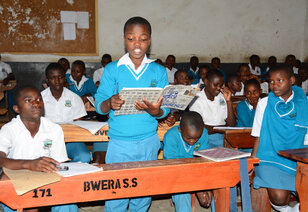Pagecontent
Put children in school, not to work
Community awareness meetings sensitize parents about the rights of children and stress the importance of education.
An estimated three million children in Uganda between five and fourteen years are still forced to work, often due to the consequences of natural disasters and conflicts that displace people, but also due to poverty that is still pervasive in many rural communities.
Trapped in such circumstances, these children miss out on their right to education. They have to work to help their families survive. This is also a common problem in Kayanja village, a fishing community in Kasese district in Western Uganda.
"I can make 5,000 Shillings a day (EUR 1,20). When I reach home and there is no food, I can give my mother this money to buy food", one of the boys who work for the fishermen nearby at Lake Edward simply states. Like him, more and more children in Kayanja dropped out of school and tried to make quick money. Of those who stayed in school, many have had their performance severely compromised due to frequent absences.
Children's job is school
This trend started to change when Karambi Action for Life Improvement (KALI) intervened. KALI is a local human rights advocacy organisation supported by the Independent Development Fund, a partner organization of the Democratic Governance Facility (DGF). DGF is a programme set up by the European Union together with seven other Development Partners including Austria in 2011 to foster good governance, the rule of law and democracy in Uganda.
In community awareness meetings, KALI sensitized the people of Kayanja village about the rights of children and stressed the importance of education for their future. The efforts by KALI were further bolstered in 2014 by the establishment of a Child Rights Club in Kayanja Primary School. The children are guided by a mentor and discuss the value of education and their rights. Joel Muhindo, a student who has reached secondary school, credits the club for this success: "I was selected as a secretary of that club. This made me active in school because the club could not do anything without me present. I had to stay in school the whole day so I improved on my performance in class." Joel stopped working in the fishing business and concentrated on his studies.
Studying for a future
To compensate for the loss of income with children staying in school, KALI also established different livelihood programmes to support affected families. As a result of KALI's efforts, school dropout rates have reduced considerably. Even teenagers who had left to work full-time or get married are now returning. Enrolment has increased from 350 to more than 480 children at Kayanja Primary School. KALI also talked with the Beach Management Unit, the body responsible for fishery in Kayanja, and convinced them to prohibit children to come to the landing site during school hours. Everybody in Kayanja now knows: It is the children's job to study for the future and school is the place to do so.


